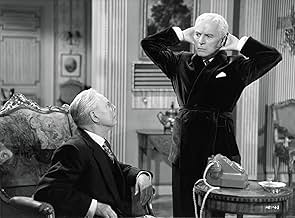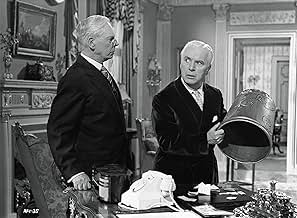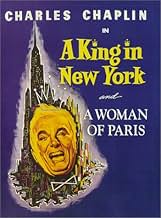VALUTAZIONE IMDb
7,0/10
9433
LA TUA VALUTAZIONE
Un monarca europeo recentemente deposto cerca rifugio a New York City, dove diventa una celebrità televisiva accidentale e in seguito viene accusato ingiustamente di essere un comunista.Un monarca europeo recentemente deposto cerca rifugio a New York City, dove diventa una celebrità televisiva accidentale e in seguito viene accusato ingiustamente di essere un comunista.Un monarca europeo recentemente deposto cerca rifugio a New York City, dove diventa una celebrità televisiva accidentale e in seguito viene accusato ingiustamente di essere un comunista.
- Premi
- 1 vittoria e 1 candidatura in totale
Recensioni in evidenza
When I rented this movie, I had no idae what to expect. Charlie Chaplin in a talkie?! I had just seen (heard?) how poor Buster Keaton's awful voice destroyed his presence as the classic stone-faced pantomine. Might Mr. Chaplin's performance in a speaking role be as sadly disappointing???
The answer in a resounding word was, "NO!" If anything, Chaplin's voice and accompanying ability to express himself with words enhanced his screen presence by providing a new dimension with which to appreciate his seemingly limitless talent.
I'm not sure just how to explain this other than the fact that I watched most of the film with a big grin glued to my face. I marvelled at the subtleties of Chaplin's performance which distinguish him not only as a silent movie actor, but as an actor of ANY era! In today's world of over-the-top silliness and questionable acting passing as good comedy, his performance is a clear indication that intelligent comedy is not an oxymoron and that the "King" of it is the same person as the king of slapstick.
If you're the kind of person who appreciates the subtlety in Woody Allen's humor, you will find yourself marvelling at "A King in New York" and you will see (and hear!) a part of Charlie Chaplin you may not ever have known existed.
The answer in a resounding word was, "NO!" If anything, Chaplin's voice and accompanying ability to express himself with words enhanced his screen presence by providing a new dimension with which to appreciate his seemingly limitless talent.
I'm not sure just how to explain this other than the fact that I watched most of the film with a big grin glued to my face. I marvelled at the subtleties of Chaplin's performance which distinguish him not only as a silent movie actor, but as an actor of ANY era! In today's world of over-the-top silliness and questionable acting passing as good comedy, his performance is a clear indication that intelligent comedy is not an oxymoron and that the "King" of it is the same person as the king of slapstick.
If you're the kind of person who appreciates the subtlety in Woody Allen's humor, you will find yourself marvelling at "A King in New York" and you will see (and hear!) a part of Charlie Chaplin you may not ever have known existed.
A King In New York was a pure delight to watch. Seeing perhaps the greatest actor of the first half of the century is always a treat and he doesn't disappoint in this film. Chaplin made this satire as a shot at the United States, who only five years earlier had denied him re-entry into the country. This was based on the fact he wouldn't come before the McCarthy hearing and make a statement on his supposed ties to the Communist party. Regardless of the basis for this film's comedy pieces, one can find a few moments where Chaplin is taking a direct shot at those who had doubted him.
The plot involves Chaplin as King Shadov, a ruler of a ficticious country whose people have ousted him based on his unwillingness to manufacture Atomic Bombs. He would rather spend the taxpayers money on finding ways to create atomic energy. Obviously this is a deliberate analogy of Chaplin being thought of as a communist although the complete opposite was the truth. So, the exiled leader goes to America in search of a fun vacation in which he can experience the excitement that he had heard about so many times before. The viewer follows Shadof and his trust aide throughout New York City and their many hilarious experiences. The best of which that come to mind are the scenes in which Chaplin pantomimes his order to a waiter who cannot hear him, the scene in which Chaplin recites the famous "to be or not to be" soliloque from Hamlet to guests at a dinner party and the scene in which Chaplin gets his finger stuck in a fire hose and cannot get it out.
One can see some elements of the tramp in Chaplin in this film including the facial expressions, his smile and the way he moves about gracefully. I had never seen Chaplin in a talking film before this one and was somewhat surprised to see how much of a great talking actor he truly is. For an actor who had done so much in silent films and only silent films, this film shows that Chaplin is one of the top actors of this century.
The only element of this film that somewhat disappointed me was the manner in which the hearings were brushed off. I believe that there was plenty of room for some gags to be thrown in here. Perhaps Chaplin felt as if he had already taken enough shots and didn't need to exploit this area.
This film is yet another example of the Chaplin greatness and I would recommend it to anyone who loves films or are interested in seeing film making magic.
8/10 stars.
The plot involves Chaplin as King Shadov, a ruler of a ficticious country whose people have ousted him based on his unwillingness to manufacture Atomic Bombs. He would rather spend the taxpayers money on finding ways to create atomic energy. Obviously this is a deliberate analogy of Chaplin being thought of as a communist although the complete opposite was the truth. So, the exiled leader goes to America in search of a fun vacation in which he can experience the excitement that he had heard about so many times before. The viewer follows Shadof and his trust aide throughout New York City and their many hilarious experiences. The best of which that come to mind are the scenes in which Chaplin pantomimes his order to a waiter who cannot hear him, the scene in which Chaplin recites the famous "to be or not to be" soliloque from Hamlet to guests at a dinner party and the scene in which Chaplin gets his finger stuck in a fire hose and cannot get it out.
One can see some elements of the tramp in Chaplin in this film including the facial expressions, his smile and the way he moves about gracefully. I had never seen Chaplin in a talking film before this one and was somewhat surprised to see how much of a great talking actor he truly is. For an actor who had done so much in silent films and only silent films, this film shows that Chaplin is one of the top actors of this century.
The only element of this film that somewhat disappointed me was the manner in which the hearings were brushed off. I believe that there was plenty of room for some gags to be thrown in here. Perhaps Chaplin felt as if he had already taken enough shots and didn't need to exploit this area.
This film is yet another example of the Chaplin greatness and I would recommend it to anyone who loves films or are interested in seeing film making magic.
8/10 stars.
Someone once described "A King in New York" as the worst film ever made by a major artist. I can think of many worse examples and while this late Chaplin picture may lack the genius of his earlier work, (it was his penultimate film; he made it several years after "Limelight" and before "A Countess from Hong Kong"), it is an often very funny satire on what Chaplin perceived as 'the modern age'. Driven out of America by McCarthyism, Chaplin constructed his New York in a British studio and typical of its writer, director, star and composer it makes no apology for its attack on right-wing politics, in particular the HUAC, as well as television, Cinemascope and plastic surgery. It's also less sentimental than it might have been, (always Chaplin's biggest fault), but the plot involving a child played by Chaplin's own son Michael, does the film no favours. On the other hand, Chaplin himself is superb and Dawn Adams is surprisingly good as a television star. No masterpiece, then but not quite the disaster some people have said of it either.
Now, I've yet to see A COUNTESS FROM HONG KONG, but out of Chaplin's full-length talkies, I didn't find A KING IN NEW YORK terrible by any stretch. In fact-- and I might lose cinephile points for admitting it-- I'd take this over the more prestigious LIMELIGHT any day! It's less self-indulgent and self-loving, and the satire of American media culture still mostly works.
Why does this get so much hate? Maybe it's the film's roughness. It's clearly set-bound and those sets do look cheap most of the time. But money can't buy inspiration, and I think this movie has more than enough inspiration to make up for its lesser production values. Many of the vignettes are delightful and the bittersweet edges (the subplot with Shadov's estranged queen, the character arc of the philosophical young boy) lend this film a great deal of memorability.
Why does this get so much hate? Maybe it's the film's roughness. It's clearly set-bound and those sets do look cheap most of the time. But money can't buy inspiration, and I think this movie has more than enough inspiration to make up for its lesser production values. Many of the vignettes are delightful and the bittersweet edges (the subplot with Shadov's estranged queen, the character arc of the philosophical young boy) lend this film a great deal of memorability.
Charlie Chaplin's A King in New York is a fine film to see when it's a laid-back afternoon and it comes on TV, as it's a bit of a surprise to come upon. It's a later Chaplin film, where he's no longer the iconic Tramp, yet in a way the logic of one of those films in terms of the society at large is still being toyed with. This time, instead of being on poverty row with holes in his shoes and a sweet and enduring love for a street girl, he plays a king whose country has gone to war and without many prospects financially comes to America to do commercials for products that he would surely rather not be pushing on the public. As life does imitate art (as far as the stereotype goes it does have a ring of constant truth), Chaplin at the time was an exile, kicked out of America for being a supposed communist, and with his non-prolific career going a little bit on the slide, he made the film as a quasi-light attack on American consumerism, of the vanity and stupidity that can come out of prosperity.
But at the same time, there is still the sensibility that Chaplin loves life and individuals, if not certain groups. This can be seen in the child character- one of Chaplin's own sons- who through his very intelligent but arrogant manner is one of the nicer and funniest characters in the film. While a lot of the humor, sometimes rather dry, is in seeing Chaplin's King and his assistant/butler talk of money problems and in the observations of the 'other', the best scenes come in showing what levels King Shadhov has to sink to in trying to pay his expensive hotel bills and stay afloat in a strange land. My favorite scenes where Shadhov's botched plastic surgery debacle, where it's funnier seeing the King trying not to laugh at a slapstick spectacle than the actual spectacle itself, and the scenes of the King trying to shill the items, often to the dissatisfied directors (I'm reminded of Lost in Translation, and in fact Chaplin's scenes are probably more successful than Coppola's).
Although the film is preachy at times- it's best when Chaplin goes for the more succinct jabs as opposed to the grandstanding, ironic since it worked perfectly at the end of the Great Dictator- the overall high-spirited and serenely theatrical direction makes this a worthwhile effort. Far from being the controversial film it got a reputation as following a non-release in the 50s in the US, it's only a cunning satire, with moments light and foreboding, and it deserves to be seen just as much as Chaplin's classics (if only by his fans, who might be apprehensive at the filmmaker making too many 'statements').
But at the same time, there is still the sensibility that Chaplin loves life and individuals, if not certain groups. This can be seen in the child character- one of Chaplin's own sons- who through his very intelligent but arrogant manner is one of the nicer and funniest characters in the film. While a lot of the humor, sometimes rather dry, is in seeing Chaplin's King and his assistant/butler talk of money problems and in the observations of the 'other', the best scenes come in showing what levels King Shadhov has to sink to in trying to pay his expensive hotel bills and stay afloat in a strange land. My favorite scenes where Shadhov's botched plastic surgery debacle, where it's funnier seeing the King trying not to laugh at a slapstick spectacle than the actual spectacle itself, and the scenes of the King trying to shill the items, often to the dissatisfied directors (I'm reminded of Lost in Translation, and in fact Chaplin's scenes are probably more successful than Coppola's).
Although the film is preachy at times- it's best when Chaplin goes for the more succinct jabs as opposed to the grandstanding, ironic since it worked perfectly at the end of the Great Dictator- the overall high-spirited and serenely theatrical direction makes this a worthwhile effort. Far from being the controversial film it got a reputation as following a non-release in the 50s in the US, it's only a cunning satire, with moments light and foreboding, and it deserves to be seen just as much as Chaplin's classics (if only by his fans, who might be apprehensive at the filmmaker making too many 'statements').
Lo sapevi?
- QuizThe first film that Sir Charles Chaplin made in the UK after his exile from America, and his last leading role in a movie.
- BlooperDuring his diatribe, Rupert claims that the Roman Empire fell with the assassination of Caesar. Caesar's assassination occurred 17 years before the Roman Empire was established.
- Citazioni
[after being told that the political turmoil in America is just a "passing phase."]
King Shahdov: Quite so. In the meantime, I'll sit it out in Europe.
- Versioni alternativeOriginal British prints run about five minutes longer than the version that was released in America in 1976. It is this American version that is available on video, but the British cut is available on disc.
- ConnessioniEdited into Histoire(s) du cinéma: Fatale beauté (1994)
I più visti
Accedi per valutare e creare un elenco di titoli salvati per ottenere consigli personalizzati
- How long is A King in New York?Powered by Alexa
Dettagli
- Data di uscita
- Paesi di origine
- Siti ufficiali
- Lingua
- Celebre anche come
- Un rey en Nueva York
- Luoghi delle riprese
- Azienda produttrice
- Vedi altri crediti dell’azienda su IMDbPro
Botteghino
- Lordo in tutto il mondo
- 910 USD
- Tempo di esecuzione1 ora 50 minuti
- Colore
Contribuisci a questa pagina
Suggerisci una modifica o aggiungi i contenuti mancanti




































